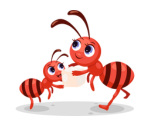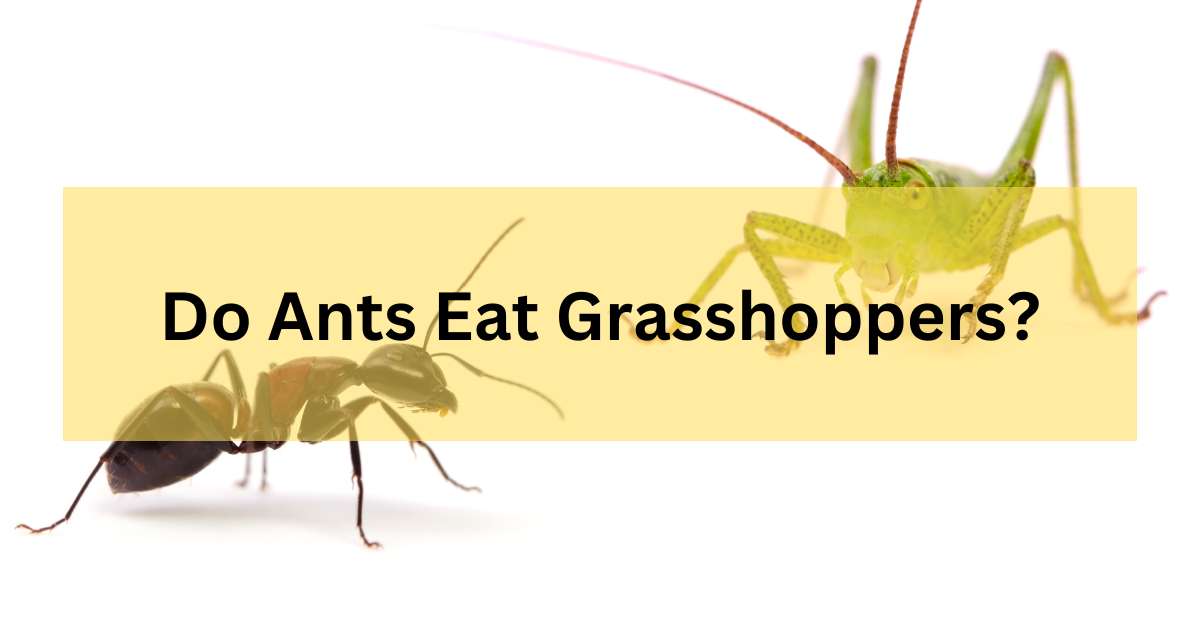You might know that ants are omnivores. Therefore, considering whether can ants actually eat grasshoppers would be worth it as an ant keeper. Grasshoppers are pretty easy to find if you seek them in your garden. So, do ants eat grasshoppers?
Although grasshoppers are not the most preferable prey, ants do eat grasshoppers when they require protein for their diet.
Knowing how to feed grasshoppers to ants, and what are the benefits of feeding grasshoppers will give you a better idea of should ants eat grasshoppers or not. Stay with me. I will tell you all the facts I know about ants and grasshoppers!
Related: Do ants eat termites?
Why do ants eat grasshoppers?
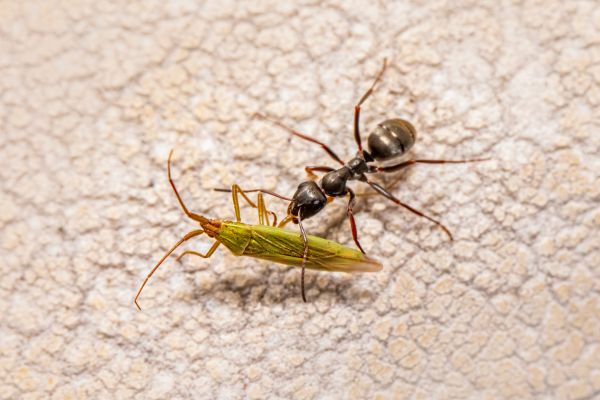
Here I will give you the most obvious reasons why do ants eat grasshoppers.
- Great source of protein
Following sugar, protein is the most essential nourishment that important to ants. Especially in the seasons when the queen lays eggs, the larvae need to be fed.
When ants desperately require protein for their diet, they might have a tendency to attack any sort of insects to take them down and carry them back to the colony for food.
Just take a look at this video, about how ants react when a grasshopper is put on their colony to eat.
- Biological pest control
Nature will always find some way to balance the competition for food between animals. On top of that, some ant species have a tendency to attack and eat grasshoppers.
This will help to balance and reduce the overgrowing population of grasshoppers in the area, as well as reduce the damage to crops caused by these hopping insects.
In terms of controlling the mass of grasshoppers, ants eat the eggs of grasshoppers since it is a great source of protein which is easy to consume as it is a fluid.
Also read: Can ants eat mealworms?
Do ants attack grasshoppers?
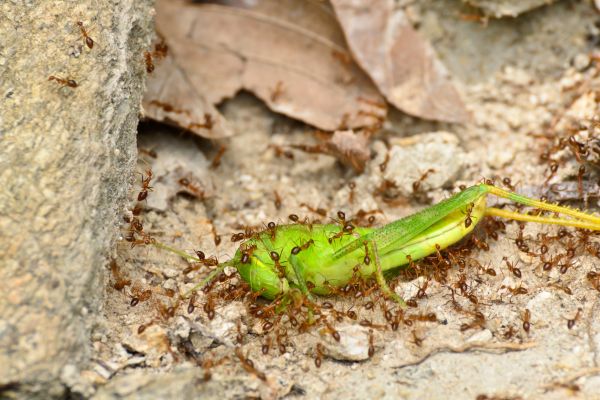
The attacking mindset of ants can vary from the species and its aggressiveness. Considering that, do ants attack grasshoppers?
Some ants attack grasshoppers for the reason of consuming them, while some other ant species do not attack grasshoppers because they do not have a sting to weak their prey.
We can simply divide the thousands of ant species into two categories upon they attacking mindset.
First category is predatory ants, which is the majority, and they are simply attacking any sort of insects, animals or any living being since they find something to eat on them.
Ants such as fire ants, bullet ants, and weaver ants with predatory habitats are likely to attack grasshoppers and eat later on.
Other ones are carrion-eaters. They are not into directly attacking other insects or animals. Instead, they will pounce on others when they are weak or just consume dead insects or animals.
For instance, if there is a grasshopper that can not move because of damaging its leg, these carrion-eater ants will attack that grasshopper for eating.
Take a look at this video of a bullet ant attacking a big grasshopper and killing it.
Are ants and grasshoppers enemies?
In the process of the food cycle and the way nature processes, sometimes predators and preys encounter each other. But predators may avoid their prey because food is not the utmost thing for them all the time.
The considerations of ants eating grasshoppers and their enmity against grasshoppers is also like the same.
Naturally, ants and grasshoppers are not enemies of each other. However, ants will act as enemies if a grasshopper lands between a group of foraging ants in a situation the ants could clearly overpower the grasshopper.
Do ants kill grasshoppers?
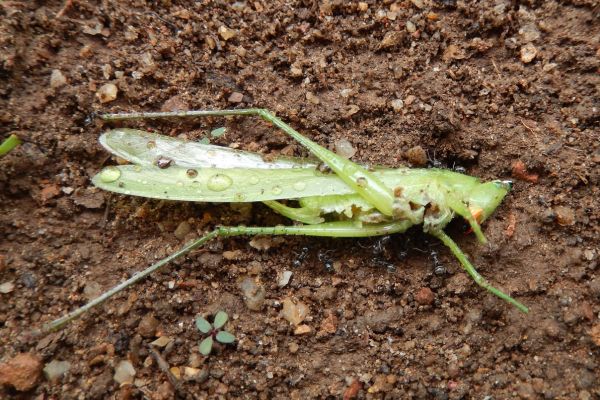
Now you already know that ants eat grasshoppers for their diet. But do ants kill grasshoppers by attacking them or do ants eat already died grasshoppers?
Ants kill grasshoppers by choking them from stinging and biting them until ants rip off their tissues.
Moreover, the process of killing grasshoppers will be easier since grasshoppers can’t sting into ants. The only way that grasshoppers can survive is by using their legs or biting.
Do grasshoppers and ants get along?
Other than the general food competition, there aren’t any habitats that make grasshoppers and ants get along since grasshoppers do not provide any accompanying food production for ants.
For example, aphids provide sugary liquid fluids to ants and ants provide protection for aphids from their predators as the return.
But there is no accompany in food between grasshoppers and ants. Plus, there isn’t too much competition between ants and grasshoppers since most of the grasshopper species have a vegetation diet.
Do ants eat insects?
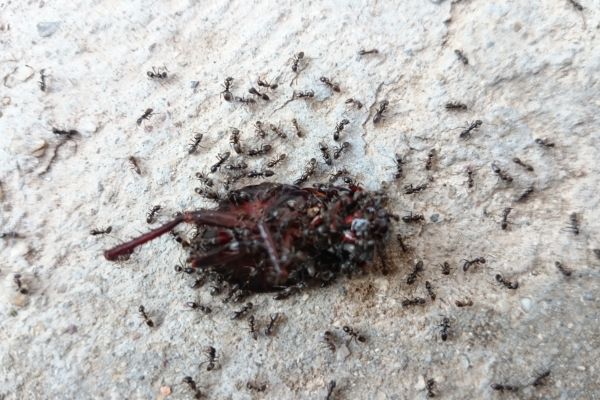
As I keep saying ants are omnivores, so asking do ants eat grasshoppers and do ants eat insects may seem to be a little silly.
However, I will answer it. Lol 🙂
Ants eat a wide range of insects including crickets, flies, bugs, aphids, and as well as dead ants in other colonies to get rich in protein. On their diet.
Since many ants are predators of other insects and Athropoda, they are attacking on other insects as an ant army. While some other non-aggressive species like black ants will rely on dead insects they encounter.
According to my experience with caring ants, most favorite insect among many ant species is crickets.
Dosen’t matter which sort of ants you keep with you. Give them some crickets. They will ask you for it over and over again.
Here are some insects that ants can eat.
Do grasshoppers eat ants?
Even though grasshoppers are known to be vegetarians, sometimes they turn out to be opportunistic.
And if you believe it or not, there are seldom originated grasshopper species that eat meat and other insects.
Considering the above facts, here is the answer that I can come up with.
Grasshoppers eat ants when they are desperately searching for food and when they feel they can choke the ant down by biting.
But grasshoppers always don’t seek ants with the intention of consuming them. Therefore grasshoppers won’t be a threat to ant colonies.
